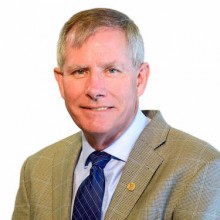Multiphysics Compact Modeling
Multiphysics modeling often conjures up the idea of large finite element method (FEM) matrices with equations for different physics at the finite element nodes. Such volumetric schemes have the inherent problem of being constrained by the number of unknowns, have problems with scale, and are difficult to incorporate intuitive insight. The problem of modeling dynamic nonlinear systems in a reasonable time seems almost out of reach. Contrast this to compact modeling one of the most powerful tools in the arsenal of electrical and computer engineers for more than 30 years. In compact modeling constitutive relations (describing the physics) and topology relations (describing the interaction of the physics) are separated enabling dynamic, strongly-nonlinear systems to be modeled quickly. This analysis technique is rarely used outside electrical and computer engineering.
Michael Steer is the Lampe Professor of Electrical and Computer Engineering at North Carolina State University. He received his B.E. and Ph.D. in Electrical Engineering from the University of Queensland, Brisbane, Australia, in 1976 and 1983. Professor Steer is a Fellow of the Institute of Electrical and Electronic Engineers cited for contributions to the computer aided engineering of non-linear microwave and millimeter-wave circuits. He is active in the Microwave Theory and Techniques (MTT) Society. In 1997 he was Secretary and from 1998 to 2000 was an Elected Member of its Administrative Committee. He was Editor-In-Chief of the IEEE Transactions on Microwave Theory and Techniques from 2003 to 2006. In 1999 and 2000 he was Professor and Director of the Institute of Microwaves and Photonics at the University of Leeds where he held the Chair in Microwave and Millimeterwave Electronics. He has authored more than 370 publications on topics related to multi-physics modeling, nonlinear RF effects; RF behavioral modeling; RF circuit simulation; microwave and millimeter-wave systems; high-speed digital design; and RF/microwave design methodology. He is an expert on circuit-field interactions. He is coauthor of the book Foundations of Interconnect and Microstrip Design, John Wiley, 2000. He is a 1987 Presidential Young Investigator (USA) and in 1994, and again in 1996, he was awarded the Bronze Medallion by U.S. Army Research for “Outstanding Scientific Accomplishment.” He received the Alcoa Foundation Distinguished Research Award from North Carolina State University 2003. He is and has been principal investigator on over $27M of projects.
Work at NCSU has extended compact modeling to multi-physics and currently mechanical, thermal, noise, molecular electronics, circuit, and electromagnetic physics are handled. There is no limit. Strongly nonlinear problems can be handled. This talk will describe 20 years of development culminating in the computer program fREEDA. Lessons learnt in maintaining a core basic research program using multiple diverse sources of funding will be discussed.

Michael Steer
Professor, North Carolina State University on September 14, 2007 at 12:30 PM in Engineering Building II, Room 1230
Michael Steer is the Lampe Professor of Electrical and Computer Engineering at North Carolina State University. He received his B.E. and Ph.D. in Electrical Engineering from the University of Queensland, Brisbane, Australia, in 1976 and 1983. Professor Steer is a Fellow of the Institute of Electrical and Electronic Engineers cited for contributions to the computer aided engineering of non-linear microwave and millimeter-wave circuits. He is active in the Microwave Theory and Techniques (MTT) Society. In 1997 he was Secretary and from 1998 to 2000 was an Elected Member of its Administrative Committee. He was Editor-In-Chief of the IEEE Transactions on Microwave Theory and Techniques from 2003 to 2006. In 1999 and 2000 he was Professor and Director of the Institute of Microwaves and Photonics at the University of Leeds where he held the Chair in Microwave and Millimeterwave Electronics. He has authored more than 370 publications on topics related to multi-physics modeling, nonlinear RF effects; RF behavioral modeling; RF circuit simulation; microwave and millimeter-wave systems; high-speed digital design; and RF/microwave design methodology. He is an expert on circuit-field interactions. He is coauthor of the book Foundations of Interconnect and Microstrip Design, John Wiley, 2000. He is a 1987 Presidential Young Investigator (USA) and in 1994, and again in 1996, he was awarded the Bronze Medallion by U.S. Army Research for “Outstanding Scientific Accomplishment.” He received the Alcoa Foundation Distinguished Research Award from North Carolina State University 2003. He is and has been principal investigator on over $27M of projects.
The Department of Electrical and Computer Engineering hosts a regularly scheduled seminar series with preeminent and leading reseachers in the US and the world, to help promote North Carolina as a center of innovation and knowledge and to ensure safeguarding its place of leading research.
